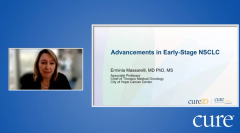
Educated Patient® Lung Cancer Summit Biomarker Testing Presentation: June 25, 2022
Watch Elisabeth King, from City of Hope, discuss biomarker testing during the CURE Educated Patient Lung Cancer Summit.
Episodes in this series

By tailoring cancer treatment to an individual’s specific genetic makeup, biomarker testing and precision medicine can improve outcomes for lung cancer treatment, according to an expert.
Elisabeth King, executive director of genomics and precision medicine at City of Hope in Duarte, California, spoke about the benefits she believes biomarker testing can hold for patients with cancer at the CURE® Educated Patient® Lung Cancer Summit.
Understanding Precision Medicine
Biomarkers – which are proteins, genes and other molecular changes that are caused by genetic changes and are specific to every individual – influence the way cancer cells grow and behave in the body.
Biomarkers are found through sampling of tumor tissue that was removed during surgery. However, King noted, there are disadvantages to this method: Surgery can be time consuming and has risks for complications.
A less invasive way of analyzing biomarkers has emerged recently: liquid biopsies, which involve drawing a blood sample to pull out circulating DNA (DNA that leaves cancer cells and enters the blood stream as cancer cells divide). Unfortunately, according to King, liquid biopsies can be expensive and are not always accessible to patients who do not live near large research centers. However, she does have hope that liquid biopsies will become more accessible and common in the future.
In turn, precision medicine is comprised of specific therapies that treat an individual's cancer as it relates to biomarkers. “Every person and cancer are different so every cancer treatment should be different,” King explained during her presentation.
This approach uses specific biomarkers found in a patient’s tumor to determine the exact treatments that have the best chance of working. Compared to chemotherapy, which works by killing all fast-growing cells, targeted therapy kills only the cancerous cells and spares healthy cells, reducing the side effects experienced by a patient.
Biomarker Testing Becoming Standard
“In general, biomarker testing should be considered at any decision point before new treatment, in order to help guide the best possible treatment decisions,” King said in an interview with CURE®. “Biomarker testing is standard of care for many stages of many cancers (and) has clearly shown a strong benefit worth the time and cost.”
She explained that biomarker testing can prevent a patient from wasting time and money on a treatment that will not work. “The worst possible outcome — for patients, insurers and physicians — is treating a cancer with an expensive drug that does not work and causes unnecessary side effects. The right drug for the right patient at the right time, should be the hallmark of cancer treatment.”
Unfortunately, according to King, biomarker testing is a useful resource that is being underutilized. She cited a 2019 study, published in the Journal of Clinical Oncology, that looked at 600,000 patients with lung cancer and found that only 22% of those patients were given biomarker testing. Moreover, 55% of those patients who underwent biomarker testing did not go on to receive targeted therapy.
Despite this, King remains optimistic for the future of biomarker testing. “Advances in biomarker testing and precision medicine have led to a record number of approvals in what has been called the ‘golden age of cancer research,’” King explained. “It is really an exciting time in oncology, and I fully expect we will continue to see incredible advances in precision medicine over time.”
Being Proactive About Biomarker Testing
King recommended for patients to ask their doctors if they have had any biomarker testing done previously. If the patient has had biomarker testing done, she then suggested for patients to ask which biomarkers were tested for, and what the results were. In addition, she encouraged patients to ask if they qualify for retesting, particularly if they have recently changed treatment plans.
If biomarker testing is not covered by insurance, she advised for patients to request individual labs to aid in appealing to the insurance company, and to also reach out to patient advocacy groups, like
Lastly, King encouraged patients to act as their own advocates and do whatever possible to access biomarker testing and precision medicine. “Biomarker testing and precision medicine may not be as easily accessible in every setting,” she stated, “but every cancer patient deserves the best treatment for their cancer.”
For more news on cancer updates, research and education, don’t forget to















